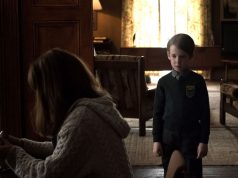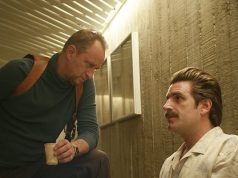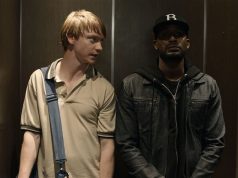Regardless of your position on the American effort in Iraq, “Turtles Can Fly” might change your mind. It shows the wretched, deprived existence of many Iraqis under Saddam Hussein, suggesting his ouster was imperative by whatever means necessary. Yet the arrival of the Americans is no magic elixir, either. The film doesn’t care about politics. It cares about the day-to-day lives of the Iraqis and Kurds, whose opinion of the war probably varies depending on whether they currently have a roof over their heads and all their body parts.
The film, written and directed by Bahman Ghobadi, is set in the weeks preceding the U.S. war on Iraq in early 2003, in a little village on the Turkish border. The people here are mostly refugees, living in tents and huts, and there are numerous orphaned children roaming around as well. They are led by Soran (Soran Ebrahim), a gawky, bespectacled lad of maybe 12 years who goes by the nickname Satellite and who governs his band of lost children like a cross between Peter Pan and Donald Trump. Each day the kids go to work in the fields, carefully removing the land mines and turning them in to Satellite, who sells them to arms dealers and merchants. The money is used to support himself and the children he cares for. Satellite even helps the village buy a satellite dish so they can see the news and get some hint of when the war is coming.
With his Western clothes and fondness for the English language, Satellite is the go-to kid in this ramshackle town. You need rope? He’ll get some rope for you. You need a translation of what the CNN anchor is saying? He’ll make up something plausible.
His attention is drawn, as is ours, to a trio of children recently arrived in the camp. Hengov’s (Hiresh Feysal Rahman) arms were blown off by land mines and he has an odd ability to predict the future. His sister, Agrin (Avaz Latif), sad-faced and solemn, carries a child around with her, little Riga (Abdol Rahman Karim), no more than 3 years old. Hengov loves the cross-eyed tyke, but Agrin seems to resent him. We suspect he is not their brother but Agrin’s son, the product of a rape when their home village was marauded.
The adults are peripheral; the movie is about the children, who are forced to act like adults. And as is nearly always the case in movies about children who act like adults, there comes a time when events become so overwhelming that the kids revert to their natural inclinations. Satellite can only be the leader of his children, barking instructions to them like a strong-willed district manager, for so long before it catches up with him. When he does finally break down and sob, the film reaches its emotional zenith. We realize how pitiful the situation is, how hopeless and desperate life has become for these people. No matter what we thought about Iraq, now we see things a little differently.
B+ (1 hr., 33 min.; Kurdish with subtitles; )





